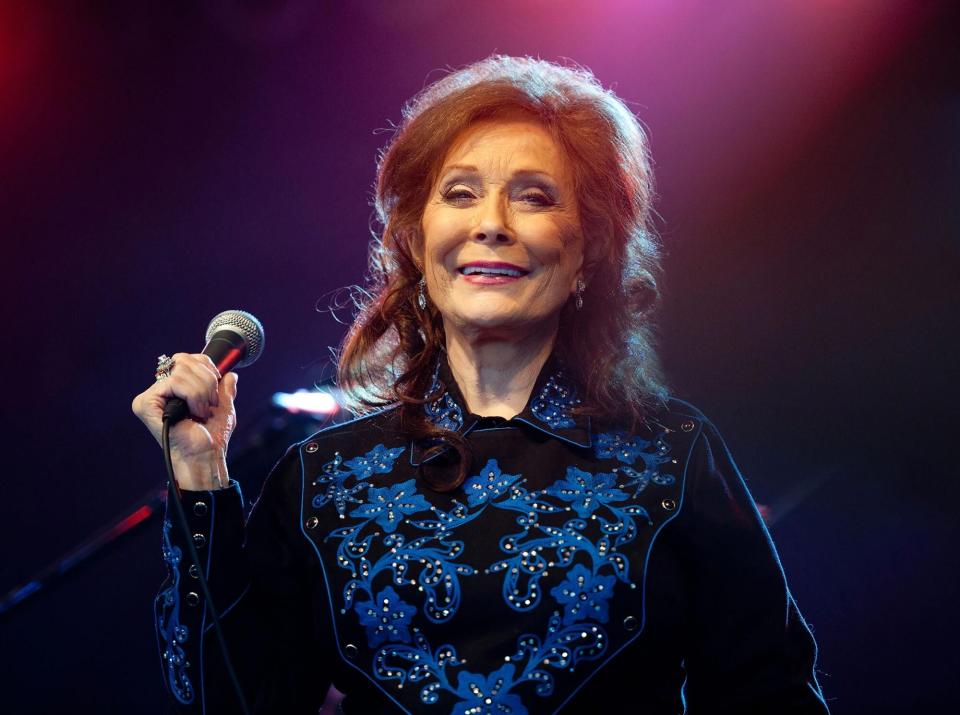Loretta Lynn, country legend and 'Coal Miner's Daughter' singer, dies
The world has lost a little bit of its twinkle today. Loretta Lynn, country music's sequined Queen of the Sexual Revolution, died Tuesday. She was 90. No cause of death was given.
"Our precious mom, Loretta Lynn, passed away peacefully this morning, October 4th, in her sleep at home in her beloved ranch in Hurricane Mills," Lynn's family said in a statement provided to EW. They have asked for privacy as they grieve and shared that a memorial for Lynn will be announced at a later date.
The legendary country star was born into the remote Appalachian town of Butcher Hollow, Van Lear, Ky., in 1932. The second of eight children (her siblings include fellow country singer Crystal Gayle), Lynn didn't do much singing or songwriting in her youth, but music was always present. In fact, when Lynn finally left her childhood neighborhood, she was shocked that other communities didn't spend so much time immersed in song.

Erika Goldring/WireImage Lynn at Bonnaroo Music and Arts Festival in 2011
"When I left the holler, I went back and told Mommy, 'Did you know that everybody don't sing?'" she recalled, speaking to EW in 2016 before the release of her reflective Full Circle LP. "I said, 'Mommy, there's a lot of people out there that can't sing, and I'm not kidding you!' Mommy found out for herself when she went to Indiana."
In 1948, a 15-year-old Lynn married Oliver "Doolittle" Lynn and together the couple moved across the country to Custer, Wash., where Doolittle worked in logging camps. She became a mother for the first time a year later and had welcomed four children all before the age of 21. Her marriage was far from idyllic, but she found solace — and a future — when her husband gave her first guitar.
"Whatever I did that day, whatever [was] on my mind, I'd write it in a song," Loretta told EW. The first song she ever penned, which she rerecorded for Circle, was the slow-rolling "Whispering Sea."
"I wrote that sitting in a tree branch hanging over the ocean, fishing," she recalled in the same interview. "When I got home I wrote it down on a piece of paper and that was it." As would become her characteristic styling, she adds, "It was just as simple as anything."
Doolittle realized her natural talent and encouraged Lynn to start singing in bars and contests. In 1960, she released "I'm a Honky Tonk Girl," which would become her first country hit. She and Doolittle promoted the record themselves, crisscrossing the country, making as many pit stops at as many radio stations as possible, eventually landing in Nashville.
Lynn's flinty voice and no-nonsense lyrics made her a staple on the Grand Ole Opry, and her work ethic made her a star. She signed with Decca and over the next 30 years released more than 50 records for the label. She cut 16 chart-topping country songs, many of which — like 1967's "Don't Come Home a' Drinkin' (With Lovin' on Your Mind)," 1968's "Fist City," 1969's "Woman of the World (Leave My World Alone)," and the autobiographical "Coal Miner's Daughter" from 1970 — have become country standards.
In 1971, she began what would prove to be an enduring and wildly successful partnership with Conway Twitty. They recorded a number of big hits — such as 1971's "After the Fire is Gone" and "Lead Me On" and 1973's "Louisiana Woman, Mississippi Man" — and toured together frequently. In 1972, Lynn became the first woman to win the coveted Entertainer of the Year Award from the Country Music Association.
In 1976, Lynn released her autobiography Coal Miner's Daughter, which was later adapted into Michael Apted's 1980 film of the same name. Lynn handpicked Sissy Spacek to play her in the movie, for which Spacek won an Oscar. Lynn has also tried her talented hand at acting over the years — she made guest appearances on both Fantasy Island and The Dukes of Hazzard, as well as The Muppet Show.
Lynn's recording career slowed in the late 1980s, but she was inducted into the Country Music Hall of Fame in 1988 and awarded the Pioneer Award from the Academy of Country Music Awards in 1995.
She spent much of the early '90s attending to her husband, who would die in 1996 from diabetes complications, but returned to making solo music in 2000. On the 40th anniversary of her career as a performer, she released Still Country. One of America's great scribes, she penned only two songs for the set, including "I Can't Hear the Music," a stunning tribute to her late husband.
The icon had been adamant that she wrote lyrics every day and, in 2004, gained a fresh new generation of fans — and her only solo Grammy — with her Jack White collaboration Van Lear Rose. After receiving a Presidential Medal of Freedom from President Barack Obama in 2013, she returned three years later with the striking LP Full Circle, which was produced by John Carter Cash, the son of Johnny and June Carter Cash.
Lynn, who is survived by four of her six children as well as her grandchildren, suffered a stroke in May 2017 but continued to tour throughout her recovery. In 2021, she released her 50th studio album, Still Woman Enough, which celebrated women in country music.
Related content:

 Yahoo Movies
Yahoo Movies 
